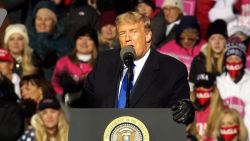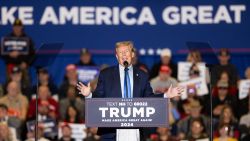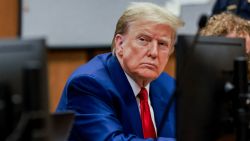There’s a challenge of a grand jury subpoena that’s now before the Supreme Court – and very little is known about it. Still, the case has gained widespread attention after it was connected to the special counsel’s investigation into Russian interference in the 2016 presidential election.
While the Mueller-connected case progressed through the courts, secrecy around it grew.
At first, Mueller’s attorneys showed up to hearings last fall that took place unannounced inside a locked courtroom. Once the judge held the company in contempt for noncompliance, the back-and-forth over an appeal stayed largely anonymous. When the attorneys argued the case at the DC Circuit Court of Appeals, an entire floor of the courthouse was locked down by security, and the attorneys came and went without being seen. The Supreme Court has now allowed the company to file its argument under seal, with any identifying information redacted from the public’s view.
The company and the country remain anonymous.
Yet the growing collection of court filings reveals bits about the country involved and the company from which Mueller wants information:
The company is wholly owned by the foreign country
The company and the interests of its foreign state are so interchangeable, that, in the Supreme Court petition, the lawyers say it was “Country A” that received the subpoena, and “Country A” that is it fighting it.
Prior to the publication of its redacted brief on Tuesday, the country’s involvement in the subpoenaed company was not fully understood. Now, it’s clear that a foreign government is as interested in fighting the subpoena as the company it controls.
The legal team opposed to the subpoena described for the high court a world in which international diplomacy falls apart if the subpoena and sanctions are enforced. “If left to stand, the judgment below could throw immunity principles into disarray around the world,” the lawyers for the company and country wrote.
The company has an office operating in the US
Judge Stephen Williams of the DC Circuit Court of Appeals dropped this tidbit in his opinion concurring with the appeals court’s decision against the company when he mentioned that in this case, “a subpoena is served on a US office of a foreign corporation.”
That’s all the court said, but raises the possibility that the company has interacted with Americans or done business on US soil.
The company appears to operate under the supervision of a regulatory body in the foreign country – and one without a well-trod process for sharing information with US investigators.
The DC Circuit described how before it decided the case, a regulator from Country A wrote to the court to back up the company’s argument that it shouldn’t be subpoenaed. The court disagreed, calling it a sham argument. “We are unconvinced that Country A’s law truly prohibits the Corporation from complying with the subpoena,” the Circuit judges wrote.
“The subpoena is unreasonable and oppressive because it would require the Corporation to violate Country A’s law,” the company and country had argued.
What kind of country, then, would raise a shaky legal argument to fend off a subpoena?
Many industries with well-established regulatory oversight and extensive business in the US have already fleshed out the contours of the law in situations like these. And many countries, particularly in Western Europe, have protocol – even treaties – already in place to share information with US prosecutors when needed.
Mueller’s team sought “information” from the company related to an “an act outside the territory of the United States in connection with a commercial activity of the foreign state elsewhere” and that the “act cause[d] a direct effect in the United States.”
This may be the most curious clue yet in the case. What kind of act could the company have committed that had a direct effect in the US, and what does that have to do with this particular criminal investigation?
At this point, it’s not clear where the next clue will come from.


















